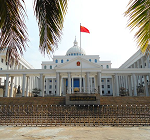Just 40 years ago, as my family and I were completing a very pleasant and productive academic year in Japan, we had our first opportunity to visit China. We had been waiting to do so for more than a decade. For me, the highlight of the visit was a four-hour dinner conversation with Prime Minister Zhou Enlai. Never one to waste time, and always well-briefed on each of his guests, with a certain air of bemusement Zhou said to me, “I understand you have done many books about our legal system.” With his country still emerging from the chaos of the Cultural Revolution, I thought that Zhou might be politely implying that I had made more of the Chinese legal system than China had.
As we both knew, the country’s formal legal system, which had been based on the Soviet model, was in tatters and had been for many years. The National People’s Congress, China’s highest state body, was not functioning. The Ministry of Justice and the Procuracy, which were responsible for prosecuting cases and supervising the government on legal matters, were defunct. The courts were in a state of collapse. The 1957-58 “anti-rightist” campaign had abolished the legal profession; the country’s few law schools and law journals had closed. Institutions for arbitrating foreign business disputes had atrophied and the People’s Republic was but a passive observer to the international organizations and agreements that ordinarily regulate nations’ relations.
JEROME ALAN COHEN is Adjunct Senior Fellow for Asia Studies at the Council on Foreign Relations.
This article was originally published by Foreign Affairs. You can read the rest of the article here.
You can read exclusive content from Gateway House: Indian Council on Global Relations, here.
Copyright © 2012 by the Council on Foreign Relations, Inc.


